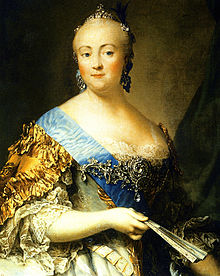Elisabeth I of Russia
| Elizabeth | |||||
|---|---|---|---|---|---|

Portrait painted by Vigilius Eriksen in 1757
|
|||||
| Reign | 6 December 1741 – 5 January 1762 | ||||
| Coronation | 6 March 1742 | ||||
| Predecessor | Ivan VI | ||||
| Successor | Peter III | ||||
| Born |
29 December 1709 Kolomenskoye, Moscow, Tsardom of Russia |
||||
| Died | 5 January 1762 (aged 52) Winter Palace, Saint Petersburg, Russian Empire |
||||
| Burial | 3 February 1762 Peter and Paul Cathedral |
||||
| Consort | Alexey Razumovsky (suspected) | ||||
|
|||||
| House | Romanov | ||||
| Father | Peter I of Russia | ||||
| Mother | Catherine I of Russia | ||||
| Religion | Russian Orthodoxy | ||||
| Signature |  |
||||
| Full name | |
|---|---|
| Elizaveta Petrovna |
Elizabeth Petrovna (Russian: Елизаве́та (Елисаве́та) Петро́вна) (29 December [O.S. 18 December] 1709 – 5 January 1762 [O.S. 25 December 1761]), also known as Yelisaveta or Elizaveta, was the Empress of Russia from 1741 until her death. She led the country during the two major European conflicts of her time: the War of Austrian Succession (1740–48) and the Seven Years' War (1756–63). On the eve of her death Russia spanned almost 16,200,000 square kilometres (6,250,000 sq mi).
Her domestic policies allowed the nobles to gain dominance in local government while shortening their terms of service to the state. She encouraged Mikhail Lomonosov's establishment of the University of Moscow and Ivan Shuvalov's foundation of the Imperial Academy of Arts in Saint Petersburg. She also spent exorbitant sums of money on the grandiose baroque projects of her favourite architect, Bartolomeo Rastrelli, particularly in Peterhof and Tsarskoye Selo. The Winter Palace and the Smolny Cathedral in Saint Petersburg are among the chief monuments of her reign. She remains one of the most popular Russian monarchs due to her strong opposition to Prussian policies and her decision not to execute a single person during her reign.
...
Wikipedia
